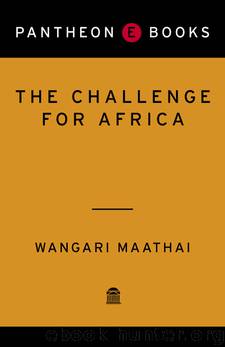The Challenge for Africa by Wangari Maathai

Author:Wangari Maathai [Maathai, Wangari]
Language: eng
Format: epub
ISBN: 978-0-307-37809-5
Publisher: Knopf Doubleday Publishing Group
Published: 2009-05-24T16:00:00+00:00
LOOKING BACK TO MOVE FORWARD
When all these forms of corruption, along with the more usual graft and theft, become embedded, the societal machine grinds to a halt. I'm not so naive as to believe that personal and collective corruption can ever be wholly eliminated; it will exist as long as there are selfish people and money to be made. But there are concrete measures that governments could take to bring about the needed revolution in ethics, if they were committed to it. An important element would be for Africans to understand collectively that the current situation wasn't always so perilous—that the majority of their forebears were honest, fair, and just, and that their societies were functional and people's basic needs were met—and challenge themselves to emulate some of these values. Part of the tragedy of Africa is that ordinary Africans don't, for the most part, remember and take pride in this history. But this history is part of who they are, and it needs to be taught and celebrated. If they did this, they could celebrate themselves, too, and not trust so much in those who mean them harm.
Another component in this revolution is for Africans to recognize that, while they may think they are “better” than their ancestors by being educated and literate, and living in an age with motorized transportation, computers, and some modern amenities, if those ancestors were to rise from the dead, they would look at them and wonder why so many contemporary Africans apparently have scorned justice, abandoned fairness, stolen from each other so freely, and let those among them who are cheats and rogues not only go unpunished but indeed be rewarded, while the weak and vulnerable are left unprotected.
While Africans cannot change the past, they can try to mold the future. One measure to which I would give priority is for children throughout Africa, from the first grade of primary school through the last year of secondary school, to be taught the values of hard work, honesty, justice, fairness, and accountability as part of the normal curriculum, so they might grow into the leaders and citizens that Africa needs. A number of leadership initiatives already exist for Africans primarily in their early twenties to mid-thirties, both within African countries and abroad; it is my hope that each of them includes as a core matter the issue of ethics.
The aim here is not education, per se: it is not as if the leadership in Africa hasn't had its share of highly educated individuals. The point is to recognize that, just as one develops new technologies and expands the potential for breakthroughs in computer science and engineering through technical colleges, so advances in leadership and the application of values must receive similar impetus.
I don't believe that the peoples of Africa are more accepting of corruption than those in other nations. As the matatu passengers confronting the policemen showed, people can spontaneously rise up and demand an end to inappropriate behavior. However, they will want to
Download
This site does not store any files on its server. We only index and link to content provided by other sites. Please contact the content providers to delete copyright contents if any and email us, we'll remove relevant links or contents immediately.
| African-American Studies | Asian American Studies |
| Disabled | Ethnic Studies |
| Hispanic American Studies | LGBT |
| Minority Studies | Native American Studies |
Cecilia; Or, Memoirs of an Heiress — Volume 1 by Fanny Burney(32558)
The Great Music City by Andrea Baker(32018)
Cecilia; Or, Memoirs of an Heiress — Volume 2 by Fanny Burney(31956)
Cecilia; Or, Memoirs of an Heiress — Volume 3 by Fanny Burney(31941)
We're Going to Need More Wine by Gabrielle Union(19046)
All the Missing Girls by Megan Miranda(16023)
Pimp by Iceberg Slim(14506)
For the Love of Europe by Rick Steves(14121)
Bombshells: Glamour Girls of a Lifetime by Sullivan Steve(14073)
Talking to Strangers by Malcolm Gladwell(13370)
Norse Mythology by Gaiman Neil(13363)
Fifty Shades Freed by E L James(13239)
Mindhunter: Inside the FBI's Elite Serial Crime Unit by John E. Douglas & Mark Olshaker(9339)
Crazy Rich Asians by Kevin Kwan(9290)
The Lost Art of Listening by Michael P. Nichols(7506)
Enlightenment Now: The Case for Reason, Science, Humanism, and Progress by Steven Pinker(7311)
The Four Agreements by Don Miguel Ruiz(6763)
Bad Blood by John Carreyrou(6621)
Weapons of Math Destruction by Cathy O'Neil(6279)
